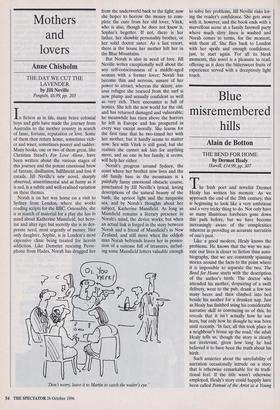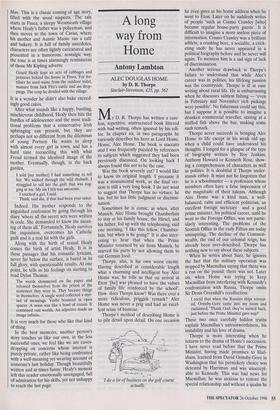Blue misremembered hills
Main de Botton
THE BEND FOR HOME by Dermot Healy Harvill £14.99, pp. 307 The Irish poet and novelist Dermot Healy has written his memoir. As we approach the end of the 20th century, this is beginning to look like a very ambitious and a very tricky thing to do. Not only have so many illustrious forebears gone down this path before, but we have become increasingly aware of the complexities inherent in providing an accurate narration of one's past.
Like a good modern, Healy knows the problems. He knows that the way we nar- rate our lives is closer to fiction than auto- biography, that we are constantly spinning stories around the facts to the point where it is impossible to separate the two. The Bend for Home starts with the description of the author's birth. The doctor who attended his mother, despairing of a swift delivery, went to the pub, drank a few too many beers and then climbed into bed beside his mother for a drunken nap. Just as Healy has finished using his considerable narrative skill in convincing us of this, he reveals that it isn't actually how he was born, but only how he thought he was born until recently. 'In fact, all this took place in a neighbour's house up the road,' the adult Healy tells us, though the story is clearly not irrelevant, given how long he had believed it to have been the truth about his birth.
Such anxieties about the unreliability of narration occasionally intrude on a story that is otherwise remarkable for its tradi- tional feel. If the title wasn't otherwise employed, Healy's story could happily have been called Portrait of the Artist as a Young Man. This is a classic coming of age story, filled with the usual suspects. The tale starts in Finea, a sleepy Westmeath village where Healy's father was a policeman, and then moves to the town of Cavan, where his mother and Auntie Maisie ran a café and bakery. It is full of family anecdotes, characters are often lightly caricatured and presented in a humorous, nostalgic way; the tone is at times alarmingly reminiscent of those Mr Kipling adverts:
Guard Healy kept an acre of cabbages and potatoes behind the house in Finea. For fer- tiliser he used waste from the outdoor toilet, manure from Jack Fitz's cattle and ass drop- pings. The crop he divided with the village.
It is a wonder he didn't also bake exceed- ingly good cakes. After what sounds like a happy, bustling, mischievous childhood, Healy then hits the hurdles of adolescence and the most tradi- tional problems that a conservative Irish upbringing can present, but they are perhaps not so different from the dilemmas of young Portnoy. He wants to sleep with almost every girl in town, and has a hard time reconciling this with what Freud termed the idealised image of the mother. Eventually, though, in the back garden, I told [my mother] I had something to tell her. We walked through the wild rhubarb. I struggled to tell her the guilt that was nag- ging at me. My sin I felt was awesome.
I touched a girl, I said.
Think, said she, if that had been your sister.
Indeed. His mother responds to the anguished confession by going through his diary 'where all the secret acts were written in code. She demanded to know the mean- ing of them all.' Fortunately, Healy survives the inquisition, overcomes his Catholic guilt and is a real hit with the girls. Along with the birth of sexual Healy comes the birth of artist Healy. It is in these passages that his romantic lyricism, never far below the surface, is bared in its full glory, with questionable results. At one point, he tells us his feelings on starting to read Dylan Thomas:
The words shimmered on the paper and released themselves from the prison of the sentences they were in. They became things in themselves. A single word collected a myr- iad of meanings. Verbs bounced in open spaces. A noun was like a bowl of cream. It contained vast worlds. An adjective made an image infinite.
It is very much for those who like that kind of thing. In the best memoirs, another person's story touches us like our own, in the less successful ones, we feel like we are eaves- dropping on concerns whose interest is purely private, rather like being confronted with a well-meaning yet wearing account of someone's last holiday. Though beautifully written and at times funny, Healy's memoir left this reader emotionally unengaged, full of admiration for his skills, yet not unhappy to reach the last page.



















































































 Previous page
Previous page